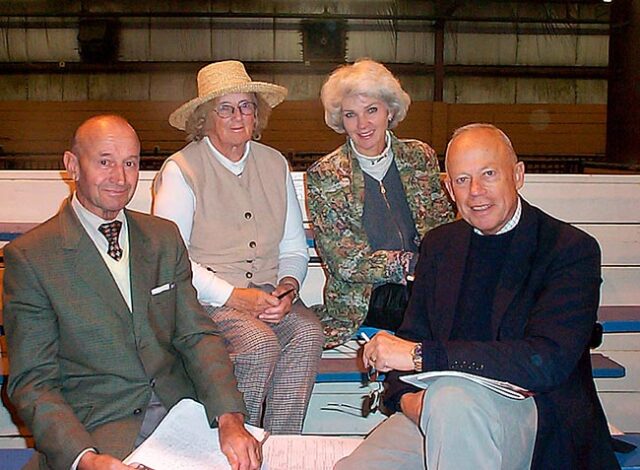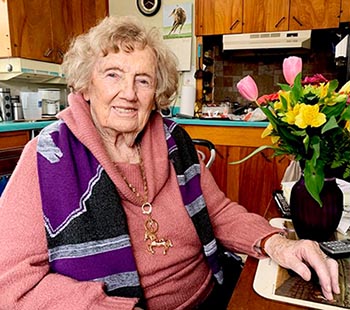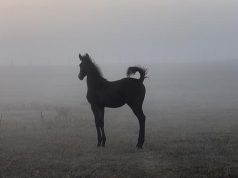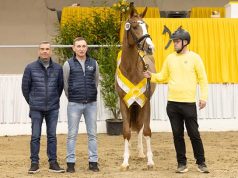
By Chris Gould / CWHBA
Photography: HSI
Eve Mainwaring was a founding director of the Canadian Warmblood Horse Breeders Association. Her knowledge and connection to sport became apparent at its founding meeting in April of 1988.
From that time on Eve continued as a director of the board until she was appointed ‘honorary lifetime member and director’ in 2010. Her roles within the association included time as the Ontario chapter president, member of the studbook committee, and delegate to the WBFSH.
For over 20 years Eve was a senior inspector, the cornerstone of the CWHBA judging commission for stallion licensing and performance testing, travelling annually across the country with international guest inspectors. Her quick eye and fair appraisals earned the respect and friendship of these internationally renowned horsemen. Alongside Manfred Lopp and Ingvar Fredricson, Eve helped establish a high standard of pro-fessionalism from the very first Canadian SPT held in 2000.
Her own breeding career began with the Wielkopolski stallion Wermiszel (Iron x Lehar), whom she imported from the Polish State Stud in Liski in 1973. In 1984 he was sold to the Olds Agricultural College in Alberta, where he stood as a foundation stallion for their burgeoning sport horse breeding program. In 1993, she acquired the Belgian Warmblood Stallion, Fantast (Etratat x Adagio), a horse with the same father as Big Ben. Fantast was soon syndicated and moved to Olds, Alberta where MJ Farms stood him until his death in 2002.
Both of these stallions contributed significantly to the Canadian Warmblood breeding program. A legacy that will carry forward through future generations. Today, Eve continues to follow the activities of the CWHBA and as a lifetime Director is a continuing source of sage advice.
The following story is published courtesy of The Brockville Recorder & Times newspaper, a member of Sun Media Community Newspapers, part of Postmedia Network. Authored by Catherine Orth, it was published on February 3, 2020.
First lady of horses turns 95

The unique world of St. Alban’s Stables, a Brockville treasure, is passing, and the extraordinary and unique woman who made it so marked a milestone on the weekend. Eve Mainwaring, Brockville’s first lady of horses, celebrated her 95th birthday Saturday, when more than fifty guests swelled the Grindstone room at the Mill to pay her tribute. Brockville’s First Lady of horses? “No, Canada’s Lady of Horses!” those who knew better exclaimed.
They came from near and far. They were notable; they were humble. They were well heeled; they were not so well heeled. But they all had one thing in common: Love, respect and admiration for their teacher; their coach; their friend. Some were students from 50 years ago; some were present-day students. More than one guest had acquired their first horse through Eve.
More than one guest was not only her student, but also their children were or are and even some, their grandchildren were or are, now her students. Flowers, photos, gifts, gold helium balloons, floated above Eve that proclaimed ‘95’. Tabletops of finger food and the biggest most beautiful cake known to cake-make-dom, with six photos of Eve, magically reproduced on the icing, were all part of the outpouring. Eve took it all in stride as, after all, what is a birthday when your mare’s in foal and a young one is expected in the spring?
Still residing in the once majestic St. Alban’s School mansion, Eve, too, is made of grander stuff. Born in Estonia in 1925, Eve’s family were Baltic Germans, landowners and judges of the lower civil court. “I grew up in a time when there were no cars, no tractors, no trucks. People rode horses to get from one place to another. Everything was horse-drawn and if there was equipment it was powered by a steam engine and pulled by a horse,” she said. A cottage by the sea and horses ridden bareback to the beach were all part of her privileged, genteel world. “My family knew they could always find me in the horse barn,” she said.
One day, when she was very young, while playing in the sand at the beach, one of the horses stepped on her hand. As her hand had been covered by sand the injury was not too severe. “A hoof mark was stamped on my hand and there was a scar for many years,” she explained. Horses were her destiny. “Horses saved my life,” said Eve, simply. Picnics and laughter – a world that all too quickly slipped away as the forces of history bore down on the family.
With Estonia achieving independence in 1919, dramatic social and economic changes occurred, as a new Estonia was forged. These changes had an immediate affect upon Eve’s family. “My family lost 70 per cent of our holdings. We became poorer and poorer,” Eve recalls. Through a secret pact with Hitler, Estonia later fell into the hands of the Soviets; the German government repatriated Balkan Germans to occupied Poland. There, Eve’s father found work on an estate with many horses. Eve particularly loved the Trakehners. As a young horse woman she was known as the person who could ride and train the most unruly steed.
Eve was able to continue her education and as she matured her desire to study agriculture became paramount, with her eye on breeding horses. “I decided to study agriculture and needed two years of apprenticeship for my college studies. I was at this school when the Soviet threat, in late 1944, became greater and greater” she said... To read the complete article you need to be a subscriber
CLICK HERE TO SUBSCRIBE TO BREEDING NEWS
SUBSCRIBERS CAN READ THE COMPLETE ARTICLE BY LOGGING IN AND RETURNING TO THIS PAGE
By late 1944, Eve’s father knew the family had to leave. The Soviets were invading from the east and the only choice was to flee west. He started to pack provisions in a wagon. Eve was at school, a distance from her family, when she got the word she had to leave. There was only one way home: By train. Panic filled the air. “You’ll not be able to get on the train,” her teacher told her, but Eve went to the station anyway. She got on. Would her parents still be there when she arrived? She called from her hometown station. No answer. “Call again,” she pleaded with the operator. Finally her stepmother answered: “Don’t leave the station, we’ll come get you.” They did. They were now refugees and thus began the trek west for the family in the freezing rains and snows of January 1945. Ever fearful of the Soviets, their only chance was to keep one step ahead of the invaders.
Besides the wagon, Eve’s father had a car but no gas, so the horses, hitched to the car, pulled, as Eve held the reins. “The first night out we slept in the ditch. We fed the horses off the side of the road with hay and oats from the wagon,” she said. With many other families of German descent, Eve’s family pushed west, finally crossing the Elbe into Germany. The bridge was shortly after blown up by the Germans to stop the Soviets.
As Baltic Germans, the families were accepted and helped. Eve eventually was settled in the British Zone, as the war gradually ground to a halt.
After the war, and still very much in refugee status, Eve’s maternal grandmother, who lived in the United States, had connections in Canada, making it possible for Eve to emigrate. A job was found in Prescott for her bright granddaughter, who not only spoke English but was educated. After settling, she moved to Brockville (Ontario).
Eve had to have accommodation and she was taken to St. Alban’s Boys School, where she was able to rent a room. The schoolmaster’s son was a very fine boy and soon romance blossomed between young Eve and Robert (Bertie) Mainwaring. “My joke always was I married my landlord so I didn’t have to pay rent,” said Eve with a smile.
And the young woman who was stamped by the horse found her way to horses again. From a small stone stable which still exists, she housed her first horses. She bought and sold a few before she met Toby. “Toby was a standardbred but I worked and worked with him until he became a fantastic eventer. He helped build my reputation as a horse woman,” said Eve.
Established now as a respected horse woman, Eve held horse competitions at St. Alban’s and one day met Ian Millar. They quickly formed a friendship and business partnership that took them to Belgium in search of the right horse for Millar. And yes, there they found Big Ben. Transported from Europe, he was quarantined at St. Alban’s before he moved to Millar’s stable near Perth. And the rest, as they say, is history.
Many, many fine years of teaching students, horse competitions and training horses ensued. Then, Bertie died. And gradually time took its toll. St. Alban’s slipped from Eve’s ownership, though she maintained the right to stay in her home of many years. Horses and teaching continued. Even as Eve’s mobility has gradually failed her, her love of teaching has not and a golf cart sees her to the arena, were she still coaches.
On any given day, there are visitors at the house, friends and family, students old and new. “Some people who come to visit Eve were her students fifty years ago. There’s always a big lunch here, every day, and Eve says: ‘Who’s coming for lunch today?’ And people show up. She’s loved and honoured,” said resident coach, Beth Norrad.
Chris Gibson is the hired hand who runs the stable but so does a stable of volunteers. Chris is a former engineer and new to horses. “He’s the best stable manager I’ve ever had!” declares Eve.
Soon, a complex of housing will exist where the hill rolls down from the stable to Broadway, the pasture for a number of active and well loved horses.
“If only we had had a million or three,” said Chris. n



